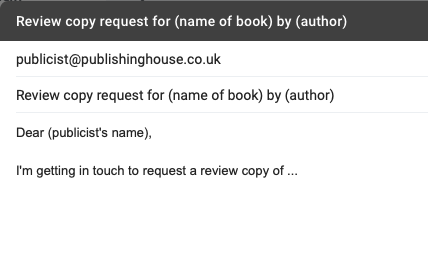How to Request Proofs and Review Copies From Book Publishers
Photo by Christin Hume via Unsplash
Book blogging, Instagramming or YouTubing can be hard work. Building an audience and posting consistently takes a lot of time and effort and, even though we love it, sometimes it’s nice to get a little something back in return. In this post I’m going to explain how you can start requesting books from publishers right now, with the audience that you already have - it’s a lot easier than you might think.
Have confidence, you can do it!
Even with just a few hundred followers, you have a niche audience that publishers really want to access. You’re worth something, so approach publishers with confidence. I received my first book for review when I had around 700 followers, about 6 months after I started my bookstagram account. You don’t need to have thousands of followers before you start working with publishers!
What can I ask for?
Publishing houses regularly work with book bloggers, instagrammers and vloggers to promote new books. They’ll usually reach out to content creators who they’ve worked with before, but it’s standard practise for publishers to be approached by other creators themselves. You can ask for any book up to one month before its publication date, right through to two months after it’s been released. After that point publishers will usually stop sending out review copies, although it’s always worth an ask if there’s a book that you’re really desperate for.
Something else to bear in mind is that proof copies won’t be printed for every new book that goes out into the world. If they are created, it’s often in very limited numbers, so expect to receive more finished copies than proofs. I actually vastly prefer receiving finished copies and always find that they perform much better on Instagram.
How to request a proof/ review copy
Decide which book you want and start off with with some research. Publishers are often broken down into mini companies called ‘imprints’, and you’ll need to find out which one publishes the book that you’re interested in. For example at Penguin there’s an imprint called Michael Joseph who publish Jojo Moyes and Giovanna Fletcher, and they have a completely separate team to other Penguin imprints, such as Ebury Press and Jonathan Cape. Next, you will need to find out who to email. It’s best to find the email address of a specific publicist rather than a general email but if that’s all you can find, that’s ok too!
Top tip: Penguin have a really great media contacts page that you can use to find exactly who you want to speak to. Take a look here.
Often when I’m trying to find a media contact for a publisher, I’ll type ‘publisher/imprint, media/press contact’ into Google and something useful will pop up. It can take quite a bit of searching to find the right contact, so have patience. Once you have an email address, you then need to write a really strong pitch email. I structure all of my pitches in the same way, which is personalised to each book and has a high success rate. I’ll break it down for you:
I start off with a very short introductory sentence, clearly setting out what I’m asking for. Then I write a paragraph explaining why I really want to read the book and what interests me about it; I’ll always mention if I’m a fan of the author, and previous books of theirs that I’ve read. Lastly, I add a short paragraph about what I do, how many followers that I have on social media, and add any useful statistics from my Instagram analytics - make sure that you use your best stats, whether they’re from your Instagram account, Twitter, Youtube channel or blog. Include a straightforward subject line to finish it all off: Review request for (book) by (author).
And that’s it! It’s a really easy email to put together, and with a bit of practise you’ll quickly get into the swing things. If a publicist doesn’t get back to you after a few weeks, then make sure that you follow up. You’re not being annoying - publishing houses get lots of emails every day and they might just need a little reminder that you want to work with them.
Time to do the work
Ok, so you’ve received your first book for review, now what? First - celebrate! This is a huge achievement and you deserve to be excited about it. Second, make sure you that read the book and produce some content for your social media, blog or both. Once your content has gone live, ensure that you send the publicist an email to, firstly, thank them for the book but also linking them to the content that you created; include the stats if they’re looking good and don’t be afraid to ask for them to add you to their blogger list.
Over time, more and more publishers will know who you are, and you’ll be added to their mailing lists and even invited to events. It’s a long game, but be persistent and your hard work will pay off.
Follow publishers on Twitter (now x) and be active
Twitter (or X) is a fantastic place to network and find opportunities. Occasionally I’ve seen publishers advertise blogger events in tweets, or announce that they’re looking for new creators to join their mailing list. Following individual publicists can be useful for this too, as they’ll often tweet out when they’re doing a mailing and are looking for more recipients.
Definitely keep an eye on Walker if you’re interested in reviewing YA books; they only open their blogger list once every six months, and the application period is announced on Twitter.
So... what’s a blog tour?
Here’s one last thing to explain before I wrap up. Once you start being noticed by publicists, you might be asked to join a blog or Instagram tour. A blog tour is essentially when a group of bloggers (or Instagrammers) are all allocated a day and then publish their content in a series, usually close to the book’s publication date. I personally don’t take part in these any more, but they can be a fun way to nab yourself a bit of your own publicity and connect with other bloggers, especially if you’re just starting out.
Phew - that was a lot! I really hope that this was useful, and do get in touch if you have any questions. Receiving free books is a huge perk of being a bookish content creator, and I highly encourage you to get involved and make the most of it.
More Blog Posts
My Top Tips for Starting a Bookstagram Account

